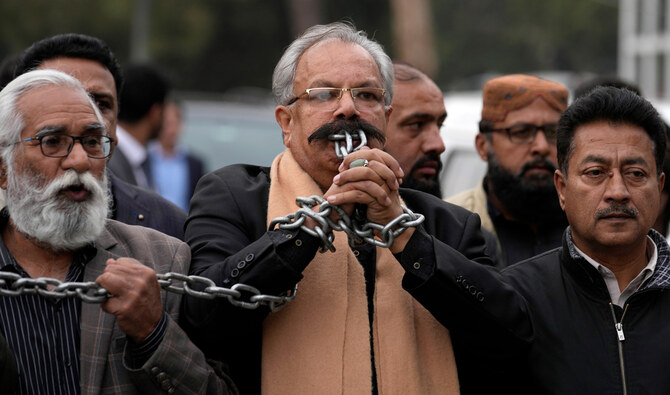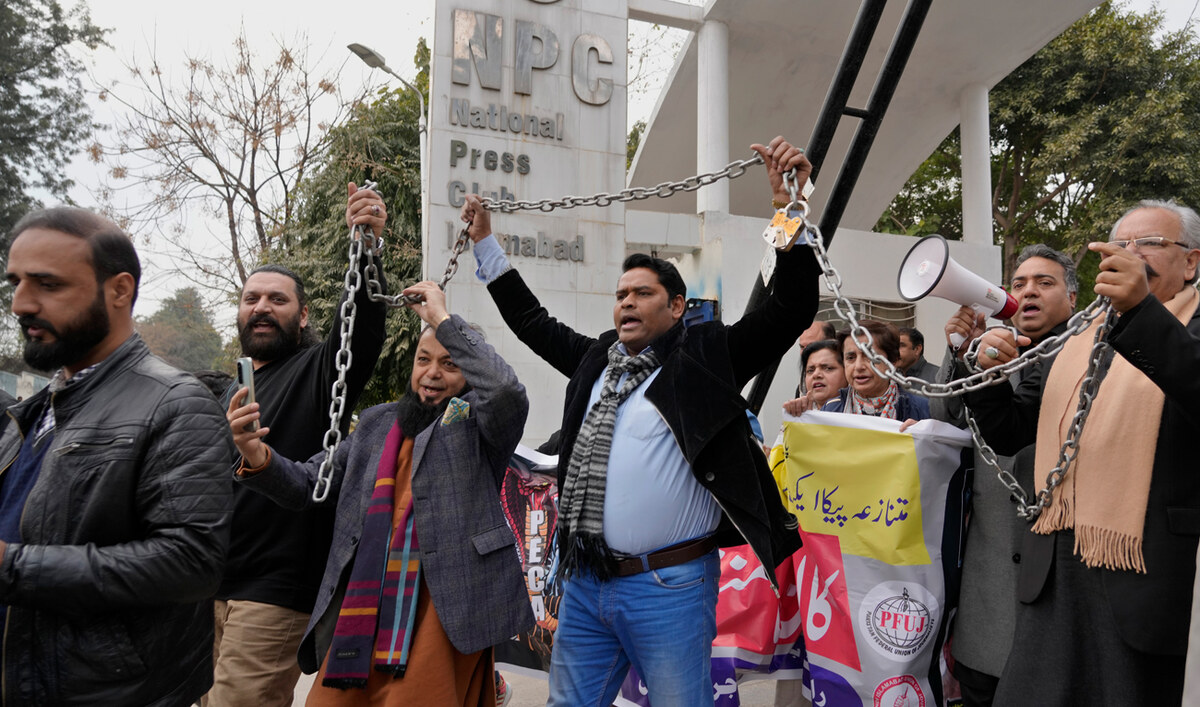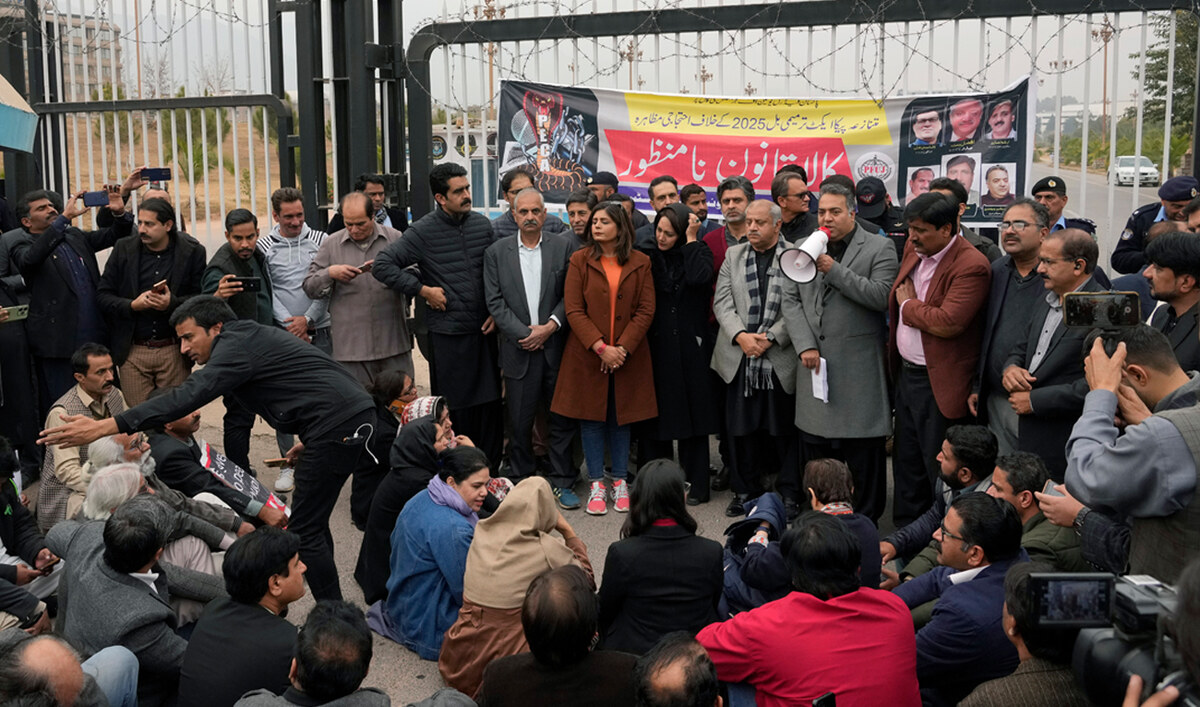ISLAMABAD: Pakistani farmers say they have been kept out of the loop and fear exploitation by Chinese businesses as Pakistan heads to Beijing later this week for the eighth meeting of the Pak-China Joint Coordination Committee where agricultural cooperation deals are expected to be signed between the two countries.
Earlier this year, Pakistan announced that a new sub-group had been set up within the $60 billion China Pakistan Economic Corridor (CPEC) of energy and infrastructure projects. The new category includes sectors like education, health skills development, housing, and most importantly, agriculture, which accounts for 20 percent of Pakistan’s GDP.
A top official at Pakistan’s largest farmers’ association said the government had not taken farmers into confidence “at any level” about agricultural cooperation with China.
“We are worried about the government’s plans of entering China into our agriculture sector without holding any prior consultations with farmers,” Mian Muhammad Umair Masood, the secretary-general the Pakistan Kissan Ittehad, told Arab News. “We fear Chinese businessmen will create a monopoly here in the name of cooperation and exploit local farmers.”
A June 2017 report in Pakistan’s Dawn newspaper outlined that agricultural cooperation with China could potentially include allowing the Chinese to lease or purchase large tracts of Pakistani farmland and operate their own farms and processing facilities using capital grants and loans from Beijing and the Chinese Development Bank.
Officials also foresee technology transfers, infrastructure upgrades, and extensive cooperation between Chinese and Pakistani farming enterprises under CPEC.
But Masood said farmers had been kept in the dark over the exact contours of the deals being planned.
“Farmers at this stage don’t know whether Chinese will be leased out the agricultural land, or allowed to purchase vast tracts of the farming land,” Masood said. “If China grows crops in Pakistan to fulfil its growing food requirement and then simply exports them to Chinese markets from here, this will be of no benefit to the local farmers and the country’s economy.”
There are also concerns about how much input provincial governments will have in planning and implementing future agricultural cooperation deals. Most CPEC negotiations so far have been carried out by the federal government whereas, under the 18th amendment, agriculture is an exclusively provincial subject.
Already, there are ever-increasing fears that energy and infrastructure deals signed under the CPEC portfolio were badly negotiated, too expensive or overly favored China. Now experts fear the same may happen with new agricultural contracts.
But Minister for Planning Khusro Bakhtyar said Pakistani farmers had nothing to fear, though he did not give any details of planned regulations to ensure greater equity in Pakistan’s arrangement with China.
“We will protect the interests of our local farmers at all costs,” he told Arab News. “Chinese cooperation will be sought in modernizing our agriculture, improving our supply chain and setting up of cold storages. Improvement in the agriculture sector remains our top priority and this is now going to be an important component of CPEC,” he added.
The first phase of CPEC included mainly ports, power plants, roads, and railway projects. Ministry of Planning officials say the government now wants to focus on medium-term projects, expected to be completed by 2015, that include the agriculture sector and the establishment of industrial zones.
Some measures the Pakistan government could consider to secure the interests of its farmers include quotas for Pakistani laborers on Chinese-owned and operated farms and requirements that specific infrastructure projects such as post-harvest storage facilities be completed before Chinese enterprises are allowed to access Pakistani farmland. Economists and experts say Pakistan can increase its agrarian exports to China manifold in the coming years if it succeeds in removing tariff and non-tariff barriers for agricultural trade.
Senior economist Dr. Athar Ahmad said China is the world’s largest importer of agricultural products and Pakistan can grab its due share of the pie by revising the Free Trade Agreement (FTA) between the two countries.
He said China’s annual imports of agricultural products are over $160 billion while “Pakistan’s share in these exports is negligible.”
“We will have to diversify our agriculture by using modern techniques and technology to increase our exports to China,” Ahmad said.
Pakistan’s agriculture sector has long been hindered by water scarcity, energy shortages, and poor post-harvest infrastructure which result in about half of the country’s perishable produce going to waste before it reaches the market.
Chinese investment in the agriculture sector can help address these issues if “the government takes a strong position in negotiations with Chinese authorities and tries to get maximum benefits for its farmers,” business editor Khurram Husain told Arab News.
He said Pakistani agriculture needed foreign investment, modern technology in harvesting and even cold storage to improve its poor agricultural supply chain.
“From use of pesticides and fertilizers to new seed varieties and especially post-harvesting handling of both perishable and non-perishable items and transportation, we are far behind in all these things,” Hussain said. “If we can improve our harvesting and post-harvesting handling just in fruit and vegetables, we can double output, but to what extent the Chinese can help, this all depends on our government’s negotiating power.”
Pakistani farmers fearful as China eyes agricultural sector
Pakistani farmers fearful as China eyes agricultural sector

- Farmers’ association says not consulted about potential agreements
- Pakistan expected to sign agricultural cooperation deals in Beijing this week
Texas hedge fund manager close to Trump leads investment delegation to Pakistan— state media

- Gentry Beach is leading “high-level” investment delegation on two-day visit to Pakistan, says state media
- State broadcaster says several agreements between Pakistan and US were signed during delegation’s visit
Islamabad: A high-level delegation of American investors featuring a business partner of US President Donald Trump has arrived in Pakistan, state broadcaster Radio Pakistan reported on Tuesday, adding that several agreements between the two countries were signed.
The delegation, led by Texas hedge fund manager Gentry Beach, has arrived in Pakistan for a two-day visit to the country. Pakistani state media said that the delegation’s arrival days after the new American administration taking office is of “great importance.”
“The visit of the US delegation to Pakistan will open new avenues for investment, economic and bilateral relations between the two countries,” Radio Pakistan said.
The development takes place as cash-strapped Pakistan engages with countries to secure foreign investment in its key economic sectors such as energy, agriculture, mining and minerals, livestock and others.
Prime Minister Shehbaz Sharif’s government has sought increased foreign trade and investment as a remedy to Pakistan’s economic woes. Pakistan, which came to the brink of a sovereign default in 2023, has suffered from a prolonged macroeconomic crisis that has drained its economic resources, weakened its currency and exacerbated its balance of payments crisis.
The South Asian country had a flurry of high-level exchanges with Saudi Arabia, Japan, Azerbaijan, Qatar and Central Asian countries last year in a bid to support its $350 billion fragile economy.
Islamabad formed a hybrid civil-military investment body in June 2023 to fast-track decisions related to investment in Pakistan’s key economic sectors. The government credits the Special Investment Facilitation Council (SIFC) for aiding its efforts to turn Pakistan’s economy around and increasing its exports over the past year-and-a-half.
However, ties between Pakistan and the US have always remained complicated. Both countries shared close defense and security cooperation in the past, particularly during the Cold War after the 1979 Soviet invasion of Afghanistan and post-September 11, 2001 attacks.
However, more recently, US officials criticized Pakistan for not sufficiently supporting their military efforts against the Taliban following the 9/11 attacks. Islamabad denies sheltering Taliban fighters and helping them regain control of Afghanistan in August 2021.
Pakistan Navy’s ‘Yamama’ holds bilateral exercise with Saudi ship in Jeddah

- Navy says exercise aimed to strengthen naval cooperation and enhance interoperability between the two allies
- Ship’s crew held table-top discussions on maritime issues with Saudi naval leadership, says Pakistan Navy
ISLAMABAD: Pakistan Navy said its newly commissioned Yamama ship visited Jeddah on Tuesday where it met the Royal Saudi Naval Forces (RSNF) leadership and held a passage exercise (PASSEX) with the Kingdom’s ‘Makkah’ ship, saying the activities were designed to strengthen cooperation and foster interoperability.
Yamama is Pakistan Navy’s fourth Offshore Patrol Vessel (OPV) that it says is equipped with advanced technologies and designed to operate in contested maritime environments. Upon its arrival at Jeddah port, the ship was received by senior RSNF officials and representatives from the Pakistan Embassy, the navy said.
During its stay, the ship’s crew engaged in professional activities, including cross-ship visits, table-top discussions on maritime issues and meetings with the RSNF leadership.
“Following the port visit, PNS YAMAMA conducted a PASSEX with HMS Makkah,” Pakistan Navy said. “The exercise was designed to strengthen naval cooperation and enhance interoperability between the two navies. Both forces reaffirmed their commitment to ensuring maritime security and promoting regional stability.”
The statement said Yamama’s visit to Saudi Arabia and the passage exercise further reinforced “strong brotherly relations” and defense collaboration between the two countries.
Pakistan and Saudi Arabia enjoy strong defense ties and bilateral security cooperation. The two nations regularly engage in joint air, ground and sea military exercises while several cadets from the Kingdom, along with counterparts from other Middle Eastern nations, annually visit Pakistan to undergo specialized military training.
Apart from defense and security ties, Pakistan enjoys strong economic and trade relations with Saudi Arabia. The Kingdom is home to over two million Pakistani expatriates, serving as the top source of remittances for the cash-strapped South Asian country.
Experts say Washington’s move to suspend foreign aid won’t impact Pakistan significantly

- US last week paused all foreign assistance to countries, saying will review if they are consistent with foreign policy
- Washington has invested in Pakistan’s critical energy, economic development and agriculture sectors over the years
KARACHI: Pakistani economists and former diplomats on Tuesday brushed aside the new American administration’s decision to suspend foreign assistance for countries around the world including Pakistan, saying it will not have a significant impact on the South Asian country and could even force Islamabad to undertake much-needed economic reforms.
US State Department confirmed on Sunday that Washington has paused all US foreign assistance funded by or through the State Department and US Agency for International Development (USAID), adding that America would review all foreign assistance programs to ensure if they are efficient and consistent with US foreign policy.
The program affects all recipient countries, including Pakistan, where numerous US-funded programs are currently in progress. For over 70 years, the US-Pakistan development partnership has been instrumental in supporting sectors such as energy, economy, agriculture, education and health. The South Asian country has been grappling with an economic crisis that in 2023 almost pushed it toward a sovereign default.
Washington has invested over $205 million in Pakistan’s energy sector, as per USAID’s website and has also provided assistance to economic development programs such as the Investment Promotion Activity ($16.8 million) and the Pakistan Private Investment Initiative ($43.5 million), aimed at enhancing Pakistan’s business climate and supporting small and medium enterprises (SMEs).
“I’m not sure if the suspension of aid will be very harmful because the real harm to the economy is coming from our own policy governance,” Kaiser Bengali, a leading Pakistani economist, told Arab News.
“On the whole at the macro level, we have seen that in the last 40 years, foreign assistance has not contributed to the economy.”
Bengali said Pakistan’s current economic issues were largely self-created.
“We have created this deficit, balance of trade, balance of payments [crisis],” he said. “We have created a huge debt burden, borrowing loan after loan for the past thirty years and not investing debt funds to increase the productivity of the economy.”
Pakistan’s Information Minister Ataullah Tarar and Khurram Schehzad, adviser to the government on finance, did not respond to Arab News’ request for comment. Pakistan’s foreign officer spokesperson Shafqat Ali Khan said he would address the queries during the foreign office’s weekly press briefing.
Zamir Akram, a former Pakistani ambassador, agreed with Bengali. He said Washington’s assistance to Pakistan is “limited” and its overall impact on the country’s economy is “negligible.”
“Since the US assistance for Pakistan is less and its funding is very low, it doesn’t have great impact,” Akram told Arab News. “We don’t know the amount of project-based assistance but its overall national assistance for Pakistan is negligent. So that’s why it won’t make any impact.”
However, Ahmed Bilal Mehboob, founder and president of Islamabad-based think tank Pakistan Institute of Legislative Development and Transparency (PILDAT), emphasized that the suspension could have significant consequences for Pakistan’s civil society and development sectors.
Mehboob said an estimated 10,000 to 15,000 people were working in organizations working to protect democracy and human rights in Pakistan.
“If funding is halted in the future, not only will thousands be left unemployed but governance and human rights work will also be severely affected,” Mehboob told Arab News.
However, he cited India’s example where civil rights groups grew indigenously, saying that they began receiving minimal foreign funding much later.
“Sincere people will continue their work using local resources,” he said.
Bengali said there might be a silver lining to the suspension of foreign assistance, adding that it may prompt Pakistan to seek local solutions and implement necessary reforms.
“If the entire world stopped funding Pakistan, that would actually be a big favor to the country,” Bengali said. “It would force us to make the necessary reforms and find our own solutions.”
Pakistan says ‘long’ Hajj package under government scheme to cost $3,805

- Long and short Hajj packages prices to cost $3,847 and $4,124, respectively, religion ministry says
- Pakistan introduced 20-25 day duration Hajj program for pilgrims’ convenience for first time this year
ISLAMABAD: Pakistan’s religion ministry announced the final cost of the government’s long and short duration Hajj packages, saying that the former will cost Rs1,075,000 ($3,805) per head while the cost for the shorter duration has been set at Rs1,150,000 ($4,120).
Saudi Arabia has allocated a quota of 179,210 Hajj pilgrims for Pakistan in 2025, with an equal split between the government and private schemes. Pakistan last year set the same cost for Hajj 2024 under the government scheme.
Pakistan’s Ministry of Religious Affairs (MoRA) this month said the government had introduced a “shortened” Hajj program of 20 to 25 days for the first time which would make the journey easier and more accessible for Pakistani pilgrims. Pakistan’s Hajj Policy 2025 also allows pilgrims to pay for the pilgrimage in installments for the first time ever.
“The Ministry of Religious Affairs has announced the final Hajj package prices,” the religion ministry said. “The final price of the long Hajj package has been set at Rs10,75,000 while the short Hajj package has been set at Rs11,50,000.”
The statement added that the third installment of Hajj dues will be collected from Feb. 1-10.
It said limited seats were left for the government’s Hajj scheme, adding that its applications would be accepted until Jan. 30. The statement also mentioned that bookings for the short Hajj scheme had now been filled.
“New applications will be accepted on a first-come first-serve basis until Jan. 30,” it added. “Private Hajj pilgrims can continue booking until Jan. 31.”
The ministry also advised Hajj organizing companies to immediately upload the data of private pilgrims to the government’s e-portal.
The ministry has also launched the Pak Hajj 2025 mobile application, available for both Android and iPhone users, to guide pilgrims. Additionally, the government announced a reduction in airfare, lowering ticket prices for federal program pilgrims to Rs 220,000, down from last year’s Rs 234,000.
Pakistan International Airlines, Saudi Airlines, and private carriers have agreed to transport pilgrims this year.
Pakistani journalists rally against law regulating social media

- Proposed law contains three-year prison sentence, $7,200 fine for sharing fake news
- Pakistan Federal Union of Journalists say law is a “direct attack” on freedom of the press
ISLAMABAD: Hundreds of Pakistani journalists rallied on Tuesday against a proposed law to regulate social media content that they say is aimed at curbing press freedom and controlling the digital landscape.
The law would establish a regulatory authority that would have its own investigation agency and tribunals. Those found to have disseminated false or fake information face prison sentences of up to three years and fines of 2 million rupees ($7,200).
The Pakistan Federal Union of Journalists led rallies in cities including Islamabad, Karachi and Lahore, to demand the government withdraws the bill, which has been passed by parliament but has yet to be signed into law by the president.
“It is a direct attack on press freedom,” PFUJ President Afzal Butt said at the rally in Islamabad, before police blocked him and other protesters from marching toward the Red Zone, which houses the prime minister’s secretariat, parliament and diplomatic offices.

“Our movement will continue until the law is revoked.”
Digital media in Pakistan has already been muffled with measures by telecom authorities to slow down Internet speeds, and social media platform X has been blocked for more than a year.
Reporters Without Borders, an organization that defends press freedom, ranked Pakistan at number 152 out of 180 on its 2024 world Press Freedom Index. The group also says Pakistan is one of the most dangerous places for journalists to work.

Parliament passed the amendments to the law known as Pakistan Electronic Crimes Act last week.
The government has defended the new regulations, saying the law is being introduced to block fake and false news.











